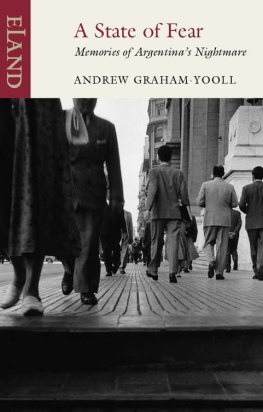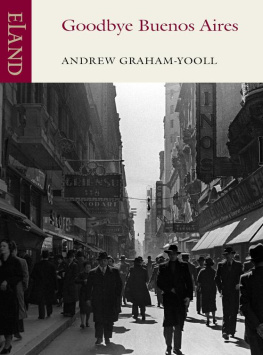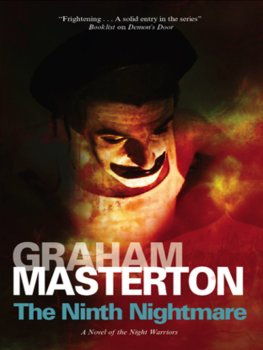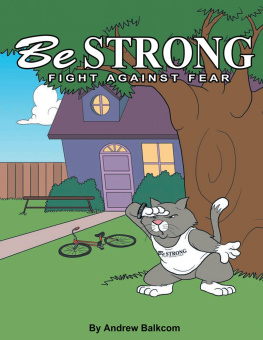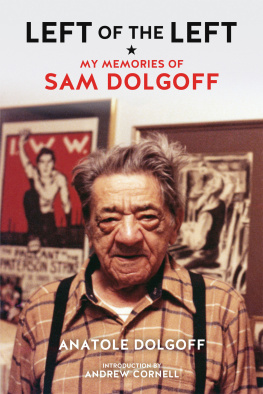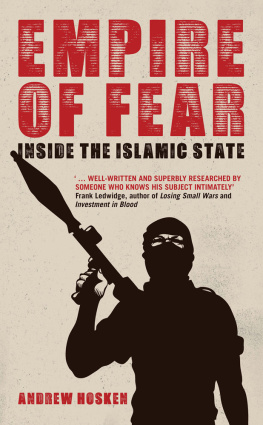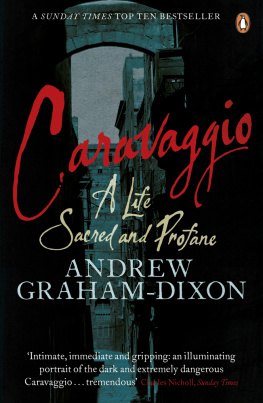Andrew Graham-Yooll - A State of Fear: Memories of Argentinas Nightmare
Here you can read online Andrew Graham-Yooll - A State of Fear: Memories of Argentinas Nightmare full text of the book (entire story) in english for free. Download pdf and epub, get meaning, cover and reviews about this ebook. year: 2020, publisher: Eland Publishing, genre: Detective and thriller. Description of the work, (preface) as well as reviews are available. Best literature library LitArk.com created for fans of good reading and offers a wide selection of genres:
Romance novel
Science fiction
Adventure
Detective
Science
History
Home and family
Prose
Art
Politics
Computer
Non-fiction
Religion
Business
Children
Humor
Choose a favorite category and find really read worthwhile books. Enjoy immersion in the world of imagination, feel the emotions of the characters or learn something new for yourself, make an fascinating discovery.
- Book:A State of Fear: Memories of Argentinas Nightmare
- Author:
- Publisher:Eland Publishing
- Genre:
- Year:2020
- Rating:3 / 5
- Favourites:Add to favourites
- Your mark:
- 60
- 1
- 2
- 3
- 4
- 5
A State of Fear: Memories of Argentinas Nightmare: summary, description and annotation
We offer to read an annotation, description, summary or preface (depends on what the author of the book "A State of Fear: Memories of Argentinas Nightmare" wrote himself). If you haven't found the necessary information about the book — write in the comments, we will try to find it.
A State of Fear: Memories of Argentinas Nightmare — read online for free the complete book (whole text) full work
Below is the text of the book, divided by pages. System saving the place of the last page read, allows you to conveniently read the book "A State of Fear: Memories of Argentinas Nightmare" online for free, without having to search again every time where you left off. Put a bookmark, and you can go to the page where you finished reading at any time.
Font size:
Interval:
Bookmark:
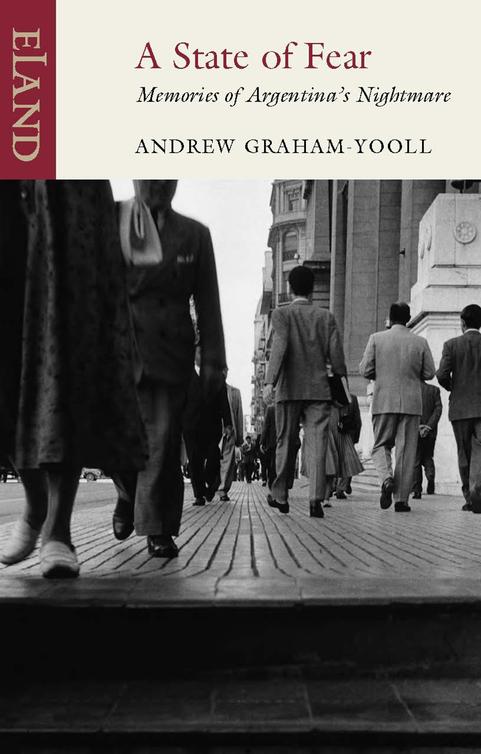
To Micaela
who lived this book with me
A State of Fear was first published in part as Portrait of an Exile by Junction Books, London, in 1981. Various passages have previously been published in the Partisan Review, London Magazine, International Herald Tribune, Literary Review, New Scientist and Index on Censorship.
Note: Some identities, place names, and references to specific events have been altered to protect individuals, or to avoid causing them embarrassment.
1930 September: Army general, Jos Felix Uriburu, leads a coup dtat against the constitutionally elected President Hiplito Yrigoyen (of the Civic Radical Union) and installs a military government for two years.
1943 June: a military coup overthrows the conservative civilian government and paves the way for Colonel Juan Pern to take office three years later.
1945 March: Argentina enters World War II and declares war on Germany, after remaining neutral throughout the hostilities.
1946 February: General Juan Pern enters government as constitutionally elected president.
1947 February: Argentina nationalises the British-owned railways.
1952 July: Evita, Eva Mara Duarte de Pern, wife of the President, dies of leukaemia.
1955 September: President Pern is overthrown by a military coup.
1958 February: constitutional administration is restored and Arturo Frondizi is elected president.
1962 March: Arturo Frondizi is overthrown by a military coup. A military-backed civilian administration remains as caretaker until elections in 1963.
1966 June: the constitutional administration of President Arturo Illia is overthrown by a military coup.
1973 May: President Hctor Cmpora takes over as constitutionally elected President at the end of the military regime. iv
1973 July: President Cmpora is removed by his own Peronist Party. A caretaker government holds new elections in September.
1973 October: General Juan Pern takes office as constitutionally elected president.
1974 July: President Juan Pern dies. His widow, Mara Estela Martinez Cartas de Pern (Isabelita), succeeds him.
1976 March: a military coup dtat removes Mrs Pern from government.
1982 AprilJune: Argentina invades the Falkland Islands and is defeated by Britain.
1983 December: President Ral Alfonsn enters office as constitutionally elected chief executive at the end of the military dictatorship.
JUNE 1973
A fter the initial greeting, after the pleasure of seeing him again a man for whose release from prison I had campaigned as far as self-censorship and my own limited guts permitted he sat on the chair by my desk. He put his elbows on his knees and looked down, took a long pull on his cigarette and blew a jet of smoke at the floor.
How would you like to be kidnapped? he asked, without looking up. Ten or fifteen heartbeats jolted my body. They filled my ears to deafness, reddened my face. The sound mixed with the thought of how worried my wife would be; whether the paper could afford a ransom; what the editor would say about my suddenly disappearing and whether I could go with so much of the paper still to be done. When the noise in my ears subsided I asked feebly, Now?
No, for Christs sake Lets arrange a time and a place.
The time of this story is in the distant dullness of undesirable memories which can become unnervingly vivid, then subside. The events are filed away with my dismay at the refinement of cruelty; with my anger at the stupidity of immolation of young men and women, of old school chums and newsroom mates, of the parents of my childrens friends They are filled with my bewilderment at the brutality of guerrilla action and counter-action in the place where I was born, Argentina. Life was easy, though often parochial, even in the largest cities, where the narrowness of views and absence of rational thought reflect the shallowness of oft-claimed cosmopolitanism. I am still shocked by the folly of youthful rebels. They found explanations for murder in a tone of voice which sounded like normal discussion in conversation, the outrage hardly noticeable in day-to-day dying, in a country where death is part of life. I am just as overwhelmed by the fury of the backlash; the blind cruelty of the most primitive beings, with the cold calculation of the very cunning.
Cruelty has run through the continent. A continent which European writers have failed to explain and few Latin Americans have succeeded in interpreting.
Now I am thinking of events between 1972 and 1976; but I am beginning to believe that it might have been any five years in the last four centuries. It is not that historical cycles have been repeated; it is just that there have been no cycles; the behaviour has never changed. There was change in the intensity of the action, not in the perspective.
Events put me now so far away from home; home on the south side of Buenos Aires, on the British-run railway line in a village built as a watering stop for British-built steam engines; where the evening train stopped at twenty-past-six, pre-established by an English manager of the Southern Railway traffic office, who thought half-past-six was the right time for the days first gin and tonic. It seems a whole era away from the annual outings of our village English School to the English pantomime in the city. This outing by the Ranelagh Community School (Ranelagh being fourteen miles south of Buenos Aires, not in south-west London) took place each year on Empire Day, the very eve of Argentinas Liberty Day. Afterwards, we wrote essays about Empire Day, of course.
He looked up, noticed my discomfort, and said: We want to talk to you. We want you to come.
He sat by my desk, the news editors desk, in the Buenos Aires Herald, Argentinas centenarian English-language daily newspaper, next door to the English Club. He stood and walked across the newsroom to a large wall-plan of the city of Buenos Aires. His finger pointed to a little green box, a park, a few blocks from the Plaza Constitucin terminal of what used to be called the Southern Railway (Ferro Carril Sud) and is now the General Roca Line of the Argentine National Railways.
Ill meet you there. At ten oclock in the morning, he told me. It was an order. I made a protest about the time, because I usually went to bed at 3 a.m. But I knew that my curiosity, his orders he was a few years younger than I: a pip-squeak giving me orders and my pride would combine to get me there on time.
He had surprised me with his visit. He had been out of prison only a few days, freed under the amnesty decreed in his first hours in office by our new President, Hctor Cmpora.
My visitor had walked into the newsroom with the air of a person who knew it. As he walked towards my desk by the window I had risen with my arms opening and a smile on my face. Keep your voice down, he had snapped, with a thin smile. I had dropped into my chair.
I told him I was delighted to see him, remarked that he looked too thin. He had always been thin; but he had become anaemic in prison. He had been arrested one year before, accused of driving the car used in the kidnapping of the managing director of a car manufacturing subsidiary in Argentina.
My friends arrest in a flat in San Telmo, the old South side of the city, as evidence of his political activism, had come as a surprise to many of us. I remembered him from parties in the late sixties, usually parties which gathered fashionable writers, playwrights, artists and publishers. My wife and I were not fashionable, but somehow were invited anyway. He had been there, collecting praise as one of the better magazine journalists, writing on events concerning the Tupamaro guerrillas in Uruguay and the international arms market. His girlfriend in those days was a beautiful young woman who would go to those parties in the very short shorts, hot pants, then fashionable. I remembered sitting by her on the floor, in conversation, my eyes straying down the length of her long, white legs. The couple had parted that year it must have been about 1970 as politics entered their lives and took them separate ways. He went into the vernacular Marxist Peoples Revolutionary Army; she into trade union activism (and later into the press and propaganda section of the nationalist Autntico Party, the surface branch of the Montoneros guerrillas. In 1976, police would go to a meeting of party officers and she would be killed with several others).
Font size:
Interval:
Bookmark:
Similar books «A State of Fear: Memories of Argentinas Nightmare»
Look at similar books to A State of Fear: Memories of Argentinas Nightmare. We have selected literature similar in name and meaning in the hope of providing readers with more options to find new, interesting, not yet read works.
Discussion, reviews of the book A State of Fear: Memories of Argentinas Nightmare and just readers' own opinions. Leave your comments, write what you think about the work, its meaning or the main characters. Specify what exactly you liked and what you didn't like, and why you think so.

